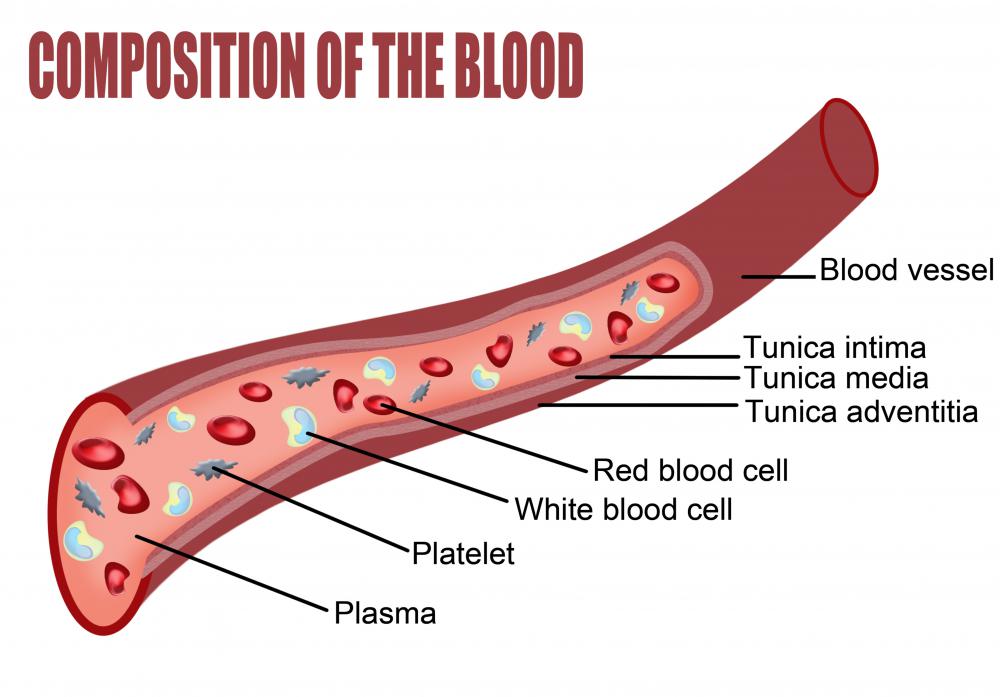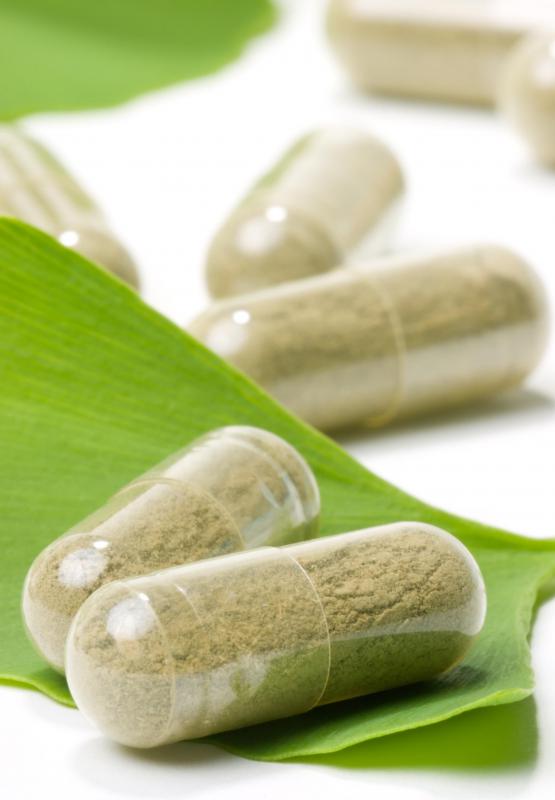At WiseGEEK, we're committed to delivering accurate, trustworthy information. Our expert-authored content is rigorously fact-checked and sourced from credible authorities. Discover how we uphold the highest standards in providing you with reliable knowledge.
What are the Best Tips for Improving Blood Circulation?
The steps for improving blood circulation can vary a bit depending on the cause of circulation problems, but there are a few general ideas that people may want to consider. Eating a healthy diet and getting plenty of exercise can potentially help people with circulation problems or work as preventative therapies. If a person has an illnesses causing his circulation problems, he would generally be advised to deal with the illness directly, using drugs and other prescribed remedies. There are some herbs, such as ginkgo biloba, that are known to be effective, and some patients may rely on therapies like massage or water therapy with varied temperatures.
Exercise has a long-term effect of helping blood circulation. It doesn't necessarily have to be a tremendous amount of exercise, and many people see huge benefits from simply walking more. According to some experts, if basic exercise is maintained from a young age, many circulation problems related to old age can be avoided.

The majority of nutritionists believe that diet can cause blood vessels to become clogged, especially as people age. The foods blamed for this effect vary a bit, but fat and simple carbohydrates like sugar tend to get the most mention among experts. Certain habits, like smoking, are also frequently blamed for circulation problems, and people may be able to benefit from avoiding those behaviors.

Individuals with high blood pressure are always in danger of developing clogged veins, which hurt circulation. Improving circulation for these people can sometimes be accomplished by always taking blood pressure medications on time. People with diabetes also tend to develop circulation problems, and they can usually benefit by following treatment plans for that disease.

Taking an aspirin a day is known to be helpful in improving blood circulation. Some people rely heavily on the herb gingko biloba for improving circulation in all parts of the body, but especially in the brain. There are other herbs, like ginger, known to help with circulation, but many of them haven't been tested extensively.
Some people rely on special physical therapy techniques. One of the most popular is massage, which helps get blood into certain muscle groups and enhances circulation throughout the body. Another method that's quite popular is hydrotherapy, where people will constantly change the water temperature in baths, showers, or saunas. Veins tend to react to temperature changes by expanding or contracting, and many people find this variation can relieve some of their circulation-related symptoms.
AS FEATURED ON:
AS FEATURED ON:














Discussion Comments
There are many ways to increase blood circulation. Of course, walking and exercising are two of the best ways. But other ways are losing weight if you need to, drinking more water, getting regular massages, and eating more fish oil, garlic and dark chocolate.
Your brain requires good blood circulation also. Just general walking and exercise will improve the blood and oxygen flow to the brain. Good nutrition, and some deep breathing helps too.
Taking aspirin to lower your blood pressure can work, but it should be noted that if you have naturally thin blood or other pre-existing blood conditions like anemia, you shouldn't take aspirin. Thinning your blood further could cause major clotting problems that could be potentially fatal if not taken care of immediately.
My mother was anemic growing up and always tells the story of taking an aspirin and then getting a nose bleed that wouldn't stop. She ended up having to go to the hospital and stay overnight until they could take care of it.
@myharley - I know how you feel. My feet are always cold, too. I don't know if I have poor blood flow or it is just natural. It is odd because in the summer, I hardly ever sweat and don't usually feel hot, but I am always colder than most people in the winter. Maybe people like us are just "cold blooded" by nature.
I have asked my doctor about it, and he didn't seem to think it was anything to worry about. To fight it, I invested in some Smartwool socks and wear socks or slippers around the house.
Unless you have a particular health problem like diabetes or high blood pressure that requires medicine, I think the best way to keep the blood circulating is to walk and do flexibility exercises and weight lifting. I know some people have to sit most of the day at work, but try to get up and move around periodically.
I have read that certain herbs like ginger and gingko biloba keep blood circulating, but I would rather wait for some evidence that they work.
No matter what time of the year it is, my feet and toes are always cold. Everybody kept telling me it was because I had poor blood circulation.
One of the best things I ever did to improve my blood flow was to begin lifting weights. I needed to get toned up and also read that by building some muscle, this would help my circulation.
I have found that I am not as cold as normal, but still find that my feet are cold in the winter. If your feet are cold, it is hard to feel warm all over.
I think the exercise has helped, and I know that I feel a lot better, so I plan on keeping it up. I hope that eventually this will make a difference in my feet too and I won't have to wear more than one pair of socks to be warm.
@orangey03 – I have increased my blood circulation by walking. Just a ten-minute walk won't do much, though. You need to be walking at least 30 minutes a day.
I know this can be hard to do during your lunch break. After all, you have to have time to eat. Then, it can be uncomfortable to take a brisk walk right after eating.
I would suggest that you walk either before or after work. If walking down your street isn't an option, then find a park with a walking track. The more you walk, the more you will notice a difference in your circulation.
It's as simple as that. You don't need to do any strenuous exercises. Just get your blood pumping by doing the easiest workout possible.
Has anyone here improved their circulation just by walking? I need to do something to get my blood moving, because I work sitting at a desk all day, and my legs and feet are suffering from it.
I walk for about ten minutes at lunch, but that doesn't seem to be helping. Do I need to be doing a more strenuous exercise, or do I just need to walk longer?
I have got to do something soon. I'm starting to get those ugly big veins in my legs that you get from being inactive, and I want to stop them from growing any larger.
@cloudel – It's kind of scary when your blood pressure starts affecting your sensation in your hands and feet. It kind of makes you feel like maybe your veins are really clogged and a blood clot is about to form.
My mother ate a diet high in fat and sugar, and her blood pressure was terribly high. She didn't do anything about it until her hands and feet went numb. She said it felt like they were being pricked with needles.
Her circulation was so poor that she was in danger of a heart attack. Her doctor placed her on medication to treat her blood pressure, and he told her that she had better start eating right, or she could die.
That was enough to motivate her. Once she lost some weight by improving her diet, she began to feel sensation in her extremities again. She knew this meant her circulation was improving.
I began having poor circulation at a young age. When I was only 26, my feet and ankles started to swell and tingle. I went to my doctor, who told me that I had developed high blood pressure.
I wasn't overweight, but I did have a kidney condition that was making my pressure rise. There was no treatment available for the condition, but my doctor said that keeping my blood pressure under control would keep it from progressing as quickly, as well as improve my circulation.
Once I started taking the medication, my circulation improved along with my blood pressure. The swelling and tingling went away, and my feet felt normal again.
Post your comments